Bestgrades
We provide our customers with the highest quality documents to help them prepare for their exams. Our revision and past exams documents are comprehensive and cover a wide range of topics, so you can be sure that you are getting the best preparation material available. We also offer a variety of study aids and resources to help you get the most out of your studying experience. Our team of experienced experts is dedicated to helping you succeed, and our commitment to providing the best materials and resources makes us the go-to source for students seeking to excel in their upcoming exams.
- 1146
- 2
- 10
Community
- Followers
- Following
53 Reviews received
1157 items
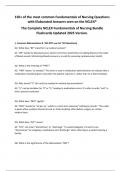
150+ of the most common Fundamentals of Nursing Questions with Elaborated Answers seen on the NCLEX® The Complete NCLEX Fundamentals of Nursing Bundle Flashcards Updated 2025 Version.
Common Abbreviations & "DO NOT use list" Q1: What does the abbreviation "NPO" stand for? A) Nothing by mouth B) Nutrition provided orally C) No past orders D) Normal patient output Answer: A) Nothing by mouth Elaboration: NPO is a medical abbreviation meaning the patient should not take anything by mouth, often used before surgery or certain medical procedures. Priority Questions Q2: In a triage situation, which patient should the nurse assess first? A) A patient with a spraine...
- Package deal
- Exam (elaborations)
- • 29 pages •
Common Abbreviations & "DO NOT use list" Q1: What does the abbreviation "NPO" stand for? A) Nothing by mouth B) Nutrition provided orally C) No past orders D) Normal patient output Answer: A) Nothing by mouth Elaboration: NPO is a medical abbreviation meaning the patient should not take anything by mouth, often used before surgery or certain medical procedures. Priority Questions Q2: In a triage situation, which patient should the nurse assess first? A) A patient with a spraine...
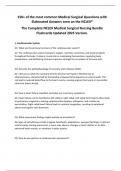
150+ of the most common Medical Surgical Questions with Elaborated Answers seen on the NCLEX® The Complete NCLEX Medical Surgical Nursing Bundle Flashcards Updated 2025 Version.
Endocrine Q1: Which hormone is primarily responsible for regulating blood glucose levels? A) Insulin B) Cortisol C) Thyroxine D) Glucagon Answer: A) Insulin Elaboration: Insulin, produced by the pancreas, lowers blood glucose levels by facilitating the uptake of glucose into the body's cells. In diabetes, this regulation is impaired. Diabetes Type 1 & 2 Q2: A patient with Type 2 diabetes is prescribed Metformin. What is the primary action of this medication? A) Increases insulin p...
- Package deal
- Exam (elaborations)
- • 34 pages •
Endocrine Q1: Which hormone is primarily responsible for regulating blood glucose levels? A) Insulin B) Cortisol C) Thyroxine D) Glucagon Answer: A) Insulin Elaboration: Insulin, produced by the pancreas, lowers blood glucose levels by facilitating the uptake of glucose into the body's cells. In diabetes, this regulation is impaired. Diabetes Type 1 & 2 Q2: A patient with Type 2 diabetes is prescribed Metformin. What is the primary action of this medication? A) Increases insulin p...
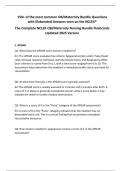
150+ of the most common OB.Maternity Bundle Questions with Elaborated Answers seen on the NCLEX® The Complete NCLEX OB.Maternity Nursing Bundle Flashcards Updated 2025 Version.
1. APGAR Q1: What does the "P" in the APGAR score stand for? A) Pulse B) Pressure C) Position D) Prolapse Answer: A) Pulse Elaboration: The APGAR score evaluates five criteria (Appearance, Pulse, Grimace, Activity, and Respiration) to assess the health of a newborn at one and five minutes after birth. The "P" specifically refers to the heart rate (pulse). 2. Acronyms Q2: What does the acronym "LMP" stand for in obstetric terms? A) Last Menstrual Period B) Labor Management Pl...
- Package deal
- Exam (elaborations)
- • 34 pages •
1. APGAR Q1: What does the "P" in the APGAR score stand for? A) Pulse B) Pressure C) Position D) Prolapse Answer: A) Pulse Elaboration: The APGAR score evaluates five criteria (Appearance, Pulse, Grimace, Activity, and Respiration) to assess the health of a newborn at one and five minutes after birth. The "P" specifically refers to the heart rate (pulse). 2. Acronyms Q2: What does the acronym "LMP" stand for in obstetric terms? A) Last Menstrual Period B) Labor Management Pl...
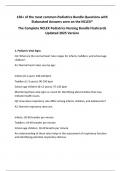
150+ of the most common Pediatrics Bundle Questions with Elaborated Answers seen on the NCLEX® The Complete NCLEX Pediatrics Nursing Bundle Flashcards Updated 2025 Version.
1. Pediatric Vital Signs Q1: What is the normal range for a resting heart rate in a 2-year-old child? A) 60-100 bpm B) 80-120 bpm C) 100-140 bpm D) 120-160 bpm Answer: B) 80-120 bpm Elaboration: The normal resting heart rate for toddlers (1-3 years) is typically between 80 and 120 beats per minute. 2. Piaget's Stages of Cognitive Development Q2: At what stage of Piaget's cognitive development do children begin to think logically about concrete events? A) Sensorimotor B) Preopera...
- Package deal
- Exam (elaborations)
- • 60 pages •
1. Pediatric Vital Signs Q1: What is the normal range for a resting heart rate in a 2-year-old child? A) 60-100 bpm B) 80-120 bpm C) 100-140 bpm D) 120-160 bpm Answer: B) 80-120 bpm Elaboration: The normal resting heart rate for toddlers (1-3 years) is typically between 80 and 120 beats per minute. 2. Piaget's Stages of Cognitive Development Q2: At what stage of Piaget's cognitive development do children begin to think logically about concrete events? A) Sensorimotor B) Preopera...
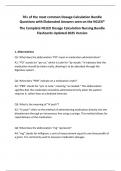
70+ of the most common Dosage Calculation Bundle Questions with Elaborated Answers seen on the NCLEX® The Complete NCLEX Dosage Calculation Nursing Bundle Flashcards Updated 2025 Version
1. Abbreviations Q1: What does the abbreviation "IM" stand for in medication administration? A) Intramuscular B) Intravenous C) Intraosseous D) Inhalation Answer: A) Intramuscular Elaboration: "IM" refers to the intramuscular route of administration, where medication is injected directly into a muscle. 2. Conversion Overview (Volume & Weight) Q2: How many milliliters are in 0.5 liters? A) 50 mL B) 100 mL C) 500 mL D) 1000 mL Answer: C) 500 mL Elaboration: There are 1000 ...
- Package deal
- Exam (elaborations)
- • 26 pages •
1. Abbreviations Q1: What does the abbreviation "IM" stand for in medication administration? A) Intramuscular B) Intravenous C) Intraosseous D) Inhalation Answer: A) Intramuscular Elaboration: "IM" refers to the intramuscular route of administration, where medication is injected directly into a muscle. 2. Conversion Overview (Volume & Weight) Q2: How many milliliters are in 0.5 liters? A) 50 mL B) 100 mL C) 500 mL D) 1000 mL Answer: C) 500 mL Elaboration: There are 1000 ...
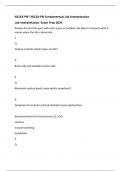
NCLEX-PN® NCLEX-PN Fundamentals Lab Interpretation Lab Interpretation Exam Prep 2024
Sodium controls which types of cells? A Brain cells and skeletal muscle cells. 2 Q Abnormal sodium levels cause which symptoms? A Symptoms from brain cell and skeletal muscle dysfunction: decreased level of consciousness (↓ LOC) seizures muscle twitching headaches 3 Q Potassium controls which types of cells? A Heart and skeletal muscle cells. 4 Q Abnormal potassium levels cause which symptoms? A Symptoms from heart and skeletal muscle dysfunction: heart dy...
- Exam (elaborations)
- • 10 pages •
Sodium controls which types of cells? A Brain cells and skeletal muscle cells. 2 Q Abnormal sodium levels cause which symptoms? A Symptoms from brain cell and skeletal muscle dysfunction: decreased level of consciousness (↓ LOC) seizures muscle twitching headaches 3 Q Potassium controls which types of cells? A Heart and skeletal muscle cells. 4 Q Abnormal potassium levels cause which symptoms? A Symptoms from heart and skeletal muscle dysfunction: heart dy...
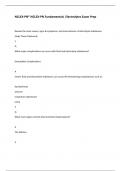
NCLEX-PN® NCLEX-PN Fundamentals Electrolytes Exam Prep.
Electrolytes Flashcards Review the most causes, signs & symptoms, and interventions of electrolyte imbalances. Study These Flashcards 1 Q What major complications can occur with fluid and electrolyte imbalances? (Immediate Complication) A Severe fluid and electrolyte imbalances can cause life-threatening complications such as: dysrhythmias seizures respiratory depression coma 2 Q What main organ controls fluid and electrolyte balance? A The kidneys. 3 Q What are th...
- Exam (elaborations)
- • 9 pages •
Electrolytes Flashcards Review the most causes, signs & symptoms, and interventions of electrolyte imbalances. Study These Flashcards 1 Q What major complications can occur with fluid and electrolyte imbalances? (Immediate Complication) A Severe fluid and electrolyte imbalances can cause life-threatening complications such as: dysrhythmias seizures respiratory depression coma 2 Q What main organ controls fluid and electrolyte balance? A The kidneys. 3 Q What are th...
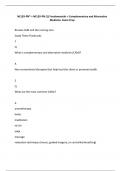
NCLEX-PN® NCLEX-PN Fundamentals Complementary and Alternative Medicine Exam Prep.
What is complementary and alternative medicine (CAM)? A Non-conventional therapies that help heal the client or promote health. 2 Q What are the most common CAMs? A aromatherapy herbs meditation tai chi yoga massage relaxation techniques (music, guided imagery, or controlled breathing) 3 Q What is a very common reason a client may use CAM? A To control pain symptoms or relieve anxiety. 4 Q Complete the sentence: Many herbs increase the risk of _____________. ...
- Exam (elaborations)
- • 6 pages •
What is complementary and alternative medicine (CAM)? A Non-conventional therapies that help heal the client or promote health. 2 Q What are the most common CAMs? A aromatherapy herbs meditation tai chi yoga massage relaxation techniques (music, guided imagery, or controlled breathing) 3 Q What is a very common reason a client may use CAM? A To control pain symptoms or relieve anxiety. 4 Q Complete the sentence: Many herbs increase the risk of _____________. ...
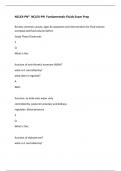
NCLEX-PN® NCLEX-PN Fundamentals Fluids Exam Prep.
What is the: function of anti-diuretic hormone (ADH)? what is it controlled by? what does it regulate? A ADH: function: to hold onto water only controlled by: posterior pituitary and kidneys regulates: blood pressure 2 Q What is the: function of aldosterone? what is it controlled by? what does it regulate? A Aldosterone is a steroid hormone: function: to hold onto sodium and water controlled by: adrenals (on top of kidneys) regulates: blood pressure 3 Q What are ...
- Exam (elaborations)
- • 8 pages •
What is the: function of anti-diuretic hormone (ADH)? what is it controlled by? what does it regulate? A ADH: function: to hold onto water only controlled by: posterior pituitary and kidneys regulates: blood pressure 2 Q What is the: function of aldosterone? what is it controlled by? what does it regulate? A Aldosterone is a steroid hormone: function: to hold onto sodium and water controlled by: adrenals (on top of kidneys) regulates: blood pressure 3 Q What are ...
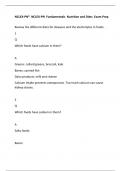
NCLEX-PN® NCLEX-PN Fundamentals Nutrition and Diets Exam Prep.
Which foods have calcium in them? A greens: collard greens, broccoli, kale bones: canned fish dairy products: milk and cheese Calcium intake prevents osteoporosis. Too much calcium can cause kidney stones. 2 Q Which foods have sodium in them? A Salty foods: bacon canned food processed foods table salt bread soy sauce steak sauce ketchup Too much sodium can lead to fluid retention. 3 Q Which foods have magnesium in them? A avocado nuts legumes tofu Magnesiu...
- Exam (elaborations)
- • 10 pages •
Which foods have calcium in them? A greens: collard greens, broccoli, kale bones: canned fish dairy products: milk and cheese Calcium intake prevents osteoporosis. Too much calcium can cause kidney stones. 2 Q Which foods have sodium in them? A Salty foods: bacon canned food processed foods table salt bread soy sauce steak sauce ketchup Too much sodium can lead to fluid retention. 3 Q Which foods have magnesium in them? A avocado nuts legumes tofu Magnesiu...

Test Bank For Brunner & Suddarth's Textbook of Medical-Surgical Nursing 15th Edition Author(s) Janice L Hinkle, Kerry H. Cheever All Chapters
Test Bank for Principles of Pediatric Nursing: Caring for Children, 7th Edition. Jane W Ball. Ruth C Bindler. Kay Cowen. Michele Rose Shaw
Introduction to Radiologic & Imaging Sciences & Patient Care 8th Edition by Arlene M. Adler Test Bank
Test Bank for Foundations of Nursing Research 7th Edition by Nieswiadomy.
Introduction to Radiologic & Imaging Sciences & Patient Care 8th Edition by Arlene M. Adler Test Bank